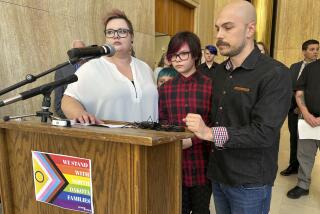Ruling Delayed on Bouvia Force-Feeding
- Share via
A Los Angeles Superior Court judge declined Wednesday to order a Lancaster hospital to stop force-feeding Elizabeth Bouvia, the quadriplegic cerebral palsy victim who unsuccessfully sought permission to starve herself to death two years ago.
Saying the 28-year-old woman’s request for a temporary restraining order raised “substantial legal questions,” Judge Warren Deering indicated that he would like some answers to those questions before making a decision. He set another hearing for Feb. 12.
Bouvia, who has insisted she no longer intends to starve herself, wants the hospital to remove a nasogastric tube through which she has been force-fed 2,000 calories of nutrients daily since last Thursday.
The tube was inserted by the medical staff at High Desert Hospital, where the 74-pound woman has been a patient since last month. According to her lawsuit, filed Tuesday, Bouvia suffers great discomfort and pain from the “massively intrusive” tube inserted through a nostril to her stomach.
“She is very disappointed,” attorney Jacqueline Scheck reported after calling Bouvia with the news of Deering’s deferral. “She said, ‘Can’t you make them use a smaller tube?’ ”
In his written order Wednesday, Deering requested further briefing and argument on present state policy regarding preserving the life of a person not deemed terminally ill.
Question’s Right of Refusal
The judge also questioned whether a person’s right to refuse medical treatment may be exercised by a non-terminally ill person “when such refusal would, to a reasonable certainty, proximately result in death.”
Deering also asked attorneys for both sides to address the questions of whether such a right to refuse care may be exercised in a publicly owned facility, and whether a patient must execute an informed consent form detailing exactly which procedures are refused, and the consequences of such refusal.
Attorneys in the Los Angeles County counsel’s office, representing the county-operated hospital, said Tuesday that force-feeding was initiated to save Bouvia’s life. The attorneys said Bouvia was “in grave condition” when the procedure was begun.
Another of Bouvia’s attorneys, Richard Scott, said, “What we didn’t have was enough medical evidence in our (court) papers. We will put the quietus on the idea that she is at death’s door.”
Scott said Bouvia has “weighed essentially 70 pounds for the last two years and has existed on the same liquid diet for the last two years. She was on this same diet for three months under the jurisdiction of County-USC Medical Center and nobody there got alarmed about that.”
In her court declaration and in an interview Tuesday, Bouvia said that before the tube was inserted she had been consuming as many liquid nutrients as she could and that solid food made her vomit. She said she had cooperated with other treatment, including intravenous infusions. She acknowledged, however, that she had lost about four pounds since entering the Lancaster facility and had regained most of the weight since the force-feeding began.
“All I am saying now is if you are going to keep me alive, keep me comfortable,” Bouvia said. “If not, give me the right to eat on my own.”
Bouvia’s suit states that she is a fully competent adult and has a constitutional right to refuse unwanted medical treatment. In addition to injunctive relief, it asks for general damages of $10,000 for each day the unwanted tube is in place and punitive damages of $10 million.
In December, 1983, while being force-fed in a Riverside County hospital, Bouvia sought court permission to starve herself. State law precludes aiding and abetting a suicide and hospital officials there had refused to help her attempt it. A Riverside Superior Court judge also denied her death wish.
More to Read
Sign up for Essential California
The most important California stories and recommendations in your inbox every morning.
You may occasionally receive promotional content from the Los Angeles Times.













